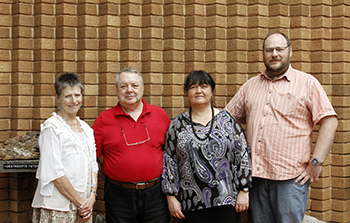Latest News Archive
Please select Category, Year, and then Month to display items
![]()
#UFSupdate (18 March 2020): UFS IMPLEMENTS MEASURES TO MINIMISE RISK OF COVID-19 TO STAFF
STATEMENT BY PROF FRANCIS PETERSEN, RECTOR AND VICE-CHANCELLOR
The executive management of the University of the Free State (UFS) welcomes the announcement of Dr Blade Nzimande, Minister of Higher Education, Science and Technology on 17 March 2020 that all post-school training institutions will have an early recess, starting on 18 March 2020. The Minister’s directive that universities should minimise risk of COVID-19 to all its staff during this time is also welcomed.
The announcement of Dr Nzimande is in line with the university’s decision on 16 March 2020 to suspend the academic programme as from 17 March 2020 and to resume it again on 14 April 2020.
It is important for us all to know that this is not business as usual, and that different thinking is required. Responsible citizenship is one of the crucial elements the world has increasingly been experiencing for the past few weeks. This is why we must act out our responsibility towards one another by focusing on ways in which social distancing can be achieved – especially during this low-risk period that South Africa is still experiencing. This is one of the reasons that informed the university’s decision on 16 March 2020 week to suspend the academic programme and also for students to vacate the residences by 20 March 2020.
The health and well-being of our staff members are equally important. The university’s Employee Task Team that was established on 16 March 2020 analysed options for the continuation of university operations during the recess period. These options were submitted to the executive management, discussed with the Chairperson of the UFS Council and approved on 18 March 2020.
Staff members who have children at school and pre-school may work from home on 19 and 20 March 2020. For the period 23 March 2020 to 13 April 2020, the number of staff members present on all three campuses will be reduced to a minimum and staff members may be allowed to work from home where practically possible.
Arrangements have been made to accommodate those staff members who are performing services which cannot be done from home (such as cleaning, gardening, maintenance, sports, etc) in a flexible and reasonable way. Similar arrangements will be made with office-based support services staff, prioritising institutional needs and based on humane and personal circumstances. Academic staff have been requested to ensure that the online learning materials are finalised and made available for the online learning platform.
The decision for employees to work from home is based on the premise that all employees are deemed to be at work from 23 March 2020 to 13 April 2020. This requires staff members to be available and contactable by line managers at all times during the university’s normal working hours.
I am comfortable that these measures will alleviate the concerns from our staff regarding the spreading of COVID-19 and the risk to themselves without compromising university operations.
Prof F W Petersen
Rector and Vice-Chancellor
University of the Free State
Famous mineralogists visit UFS Geology
2017-04-25

From the left: Prof Marian Tredoux, Associate
Professor at the UFS Department of Geology;
Prof Giorgio Garuti; from the University of Leoben,
Dr Federica Zaccarini, also from the
University of Leoben and Dr Freddie Roelofse,
Head of the Department of Geology at the UFS.
Photo: Rulanzen Martin
Years of academic friendship and collaboration is what makes Prof Giorgio Garuti and Dr Federica Zaccarini return to the University of the Free State (UFS) every so often.
The world-renowned academic duo from the University of Leoben in Austria were guest lecturers at the UFS Department of Geology. “We are here because we have known Professor Marian Tredoux and the Geology Department, for a long time. We are really happy to be here, and to be given the opportunity to present talks,” said Dr Zaccarini. The two are experts in platinum-group element mineralogy and each has given their surname to minerals namely, the Garutiite and Zaccariniite minerals.
Visit great advantage for research
They are acclaimed experts on very small minerals (smaller than a hundredth of a millimetre) with emphasis on platinum group elements in chrome-rich rocks. “Their visit is a great advantage for us. We also conduct research on these minerals and can learn from them,” said Prof Marian Tredoux, affiliated researcher at the Department of Geology.
Dr Zaccarini gave a lecture on Chromitites, and associated platinum-group elements, in ophiolites on Wednesday 5 April 2017 and Dr Garuti presented a lecture on Uralian-Alaskan complexes: a puzzling source of platinum, on Thursday 6 April 2017. During the talks they examined the association of the platinum-group minerals with chromite, rather than sulphide, and how this association can lead to the formation of unusual platinum-group element ores.
Collaboration on various academic papers
They and Prof Tredoux have collaborated on various research articles over the past four years, which have been published in various important international scientific journals. “These journals play an important role in calculating the H-scale which measures how important a researcher’s work is on an international scale,” said Prof Tredoux.